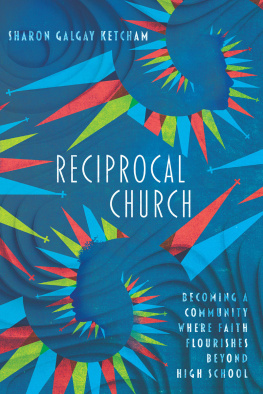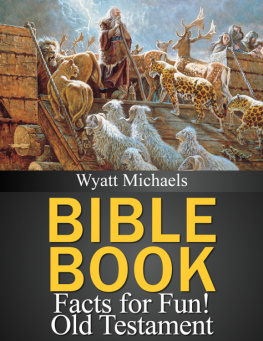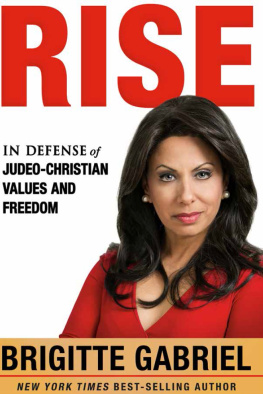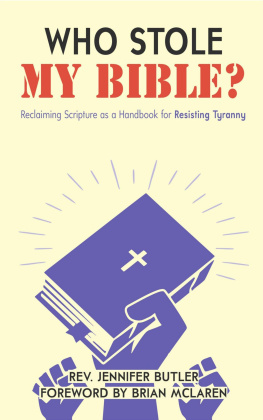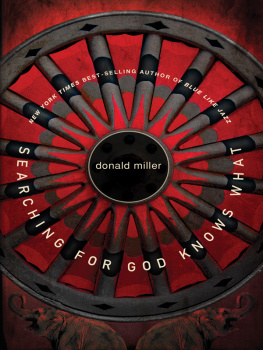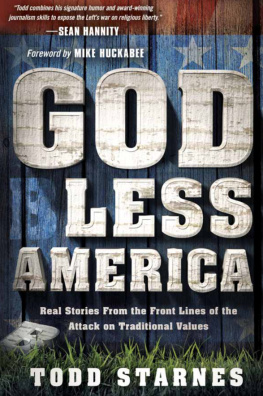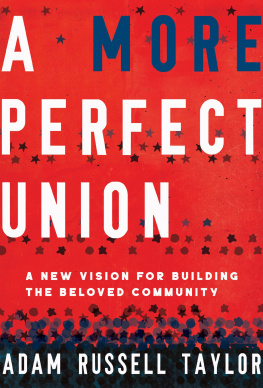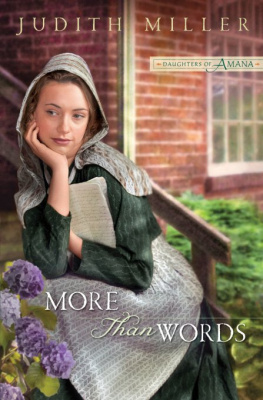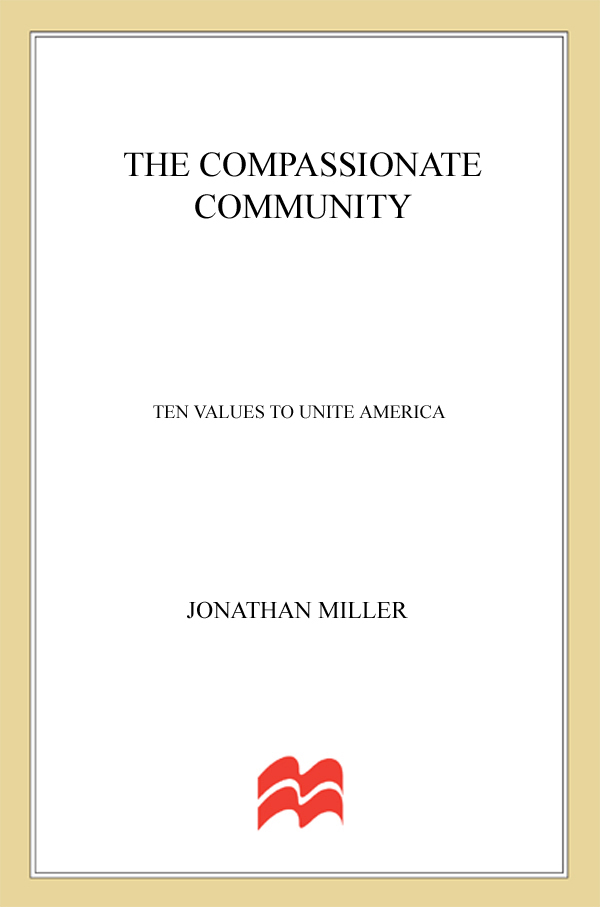Contents
Guide

The author and publisher have provided this e-book to you for your personal use only. You may not make this e-book publicly available in any way. Copyright infringement is against the law. If you believe the copy of this e-book you are reading infringes on the authors copyright, please notify the publisher at: us.macmillanusa.com/piracy.
Contents
To my Dad,
Who never got the chance to write his book,
But whose voice echoes throughout these pages.
The Compassionate Community was born in the Sunday School class I have taught since 1997 to ninth and tenth graders at Temple Adath Israel in Lexington, Kentucky. I have called the course Tikkun Olam, after the Jewish tradition that means literally to repair the world and deems everyone responsible to help make the world a better place. Thanks to the flexibility provided me by principals Marsha Rose and Jane Grise and Rabbis Jonathan Ad-land and Marc Kline, I have been able to continue to change and innovate, and ultimately expand the class to discuss the concepts of faith, values, and politics, all within the umbrella of the Judeo-Christian and American traditions. My task has been made easier by the help of regular guests to my class, including Jim Newberry, John Roach, and Kathy Stein, who taught me their own faith perspectives.
I was inspired to put pen to paper (actually finger to keyboard) by a seminar I attended at the Aspen Institute, sponsored by the Democratic Leadership Council (DLC). Shortly after the 2004 election, the DLC brought together a few dozen young leaders to talk about the future, and I was inspired both by their vision and optimism, as well as their encouragement about my ideas and perspective. A second Aspen Institute eventthe inaugural Rodel Fellowship program, which involves 24 young elected officials (12 Democrats and 12 Republicans) from across the countryhelped me refine my thoughts and explore new avenues for discussion. I am in debt to each of the participants, as well as to the organizers, particularly Aspen moderator and Wofford College President Ben Dunlap, whose teachings on political philosophy were very influential on my writing, especially his notion that Thomas Jeffersons Declaration of Independence, Abraham Lincolns Gettysburg Address, and Martin Luther King, Jr.s, Letter from a Birmingham Jail represent the three great documents of American liberty.
There are several people whom I have never met who have inspired and educated me through this process. Rabbis Mark Gopin, Mark Levine, and Sid Schwartzs Jewish Civics: A tikkun olam/ World Repair Manual serves as the textbook for my Sunday School class, and has directed me to many of the Talmuds great lessons that are included in this book. I am also indebted to Rabbis Joseph Telushkin and Harold Kushner for their inspiring and instructive texts on Jewish law and tradition. And Rabbi Ken Carr (my college roommate and best man at my wedding) gave me invaluable advice and instruction.
Christian authors such as Rick Warren, Jim Wallis, and my friends Tony Campolo and Roy Herron provided me with a broad introduction to Jesus and his teachings, and directed me to key passages in the New Testament for education and inspiration. The Reverend Christopher Skidmore provided me extensive assistance on New Testament translation and interpretation. And Huston Smith, William Eerdmans, and Karen Armstrong gave me a greater understanding of Eastern religious philosophy and teaching.
I never imagined that the process of publishing a book would be so complex. I am very grateful to my agent, Will Lippincott, whose enthusiasm and expertise helped guide this project to completion, as well as to my friends Michael Bloomfield and David Sirota for introducing me to Will and giving me advice on the publishing process. I am also grateful to Amanda Johnson, my outstanding editor, and all of the staff at Palgrave Macmillan for having the faith to publish this book and help bring it to its finished form.
The actual writing was a labor of love, and I am fortunate to have so many friends who offered their advice and support during the process. These include Josh Bowen, Gene Brockopp, John Y. Brown, III, Chad Brownstein, Julian Carroll, Josh Cherwin, David Dixon, Mickey Edwards, Al From, Ron Granieri, Rebecca Herpick, Greg Jones, Martin Kaplan, Nancy Jo Kemper, Kit Kincaide, Ivan Kronenfeld, Jeffrey Liebman, Crit Luallen, Mindy Lubber, Clark Mandel, Will Marshall, Bob Massie, Brent McKim, Steve Neal, Avinash Sathaye, Ted Schlechter, Steven Schulman, Bill Stone, Sayeed Syeed, Barbara Dafoe Whitehead, and Alan Young.
I am also blessed with a cadre of former and current staffers who, in their free time, helped make this book a possibility. They include Chad Aull, Rachel Belin, Angela Burton, Dan Logsdon, Kenneth Mansfield, Becky McCauley, and Dianne Wilson.
My family has been a never-ending source of support and love. My mom, Penny Miller, an accomplished author herself, gave me great encouragement. My sister, Jennifer Miller, was a valuable fountain of ideas and editing suggestions. And my two daughters, Emily and Abigail, consistently provided perspective and inspiration.
I owe three people above all my thanks for making this book possible: Brooke Parker, my chief of staff, who provided me with invaluable knowledge by guiding me through the doorways of a thousand classrooms and courthouses in Kentucky; David Hale, my consigliere and best friend, for serving as my sounding board on all issues of policy and faith, and as my primary teacher on Christianity, both in word and practice; and most of all, my wife Lisa Miller, for reminding me every day of what is truly important, and whose love and support sustains me and our family.
Please note that some of the links referenced in this work are no longer active.
Two thousand years ago, there was a great rabbi by the name of Hillel the Elder. Hillel was widely known and respected in all of Israel for his wisdom and knowledge. Even today, his moral and legal decisions serve as a cornerstone of Jewish tradition.
One day the rabbi was approached by a cynical pagan who did not believe in Hillels God. The pagan issued Hillel a challenge: If the rabbi could teach him the entire Torahthe first five books of the Hebrew Biblewhile standing on one foot, the nonbeliever would convert to Judaism. The rabbi accepted the challenge. Hillel declared: What is hateful to you, do not do unto your neighbor. That is the whole of the Torah; all the rest is commentary. Now go and learn it.
A few years later, Jesus of Nazareth was walking many of the same paths of ancient Israel preaching his Gospel (good news). He was approached by a skeptical group of rabbis who asked a question similar to the one posed to Hillel: Teacher, which is the greatest commandment in the Law? Jesus replied that all of Gods law could be summed up in two commandments. First, you shall love the Lord your God with all your heart and with all your soul and with all your mind. And second, you shall love your neighbor as yourself. Jesuss Golden Rule echoed Hillels teachings: Treat people the same way you want them to treat you.
These two stories illuminate an eternal, universal truth. There is no value more celebrated in the human experience than compassion for others. As the renowned Christian author C. S. Lewis recognized, nearly every world religiondespite enormous geographic and cultural differences over many centurieshas accepted Gods revelation of compassion for others. for an illustration of Lewiss principle.)



